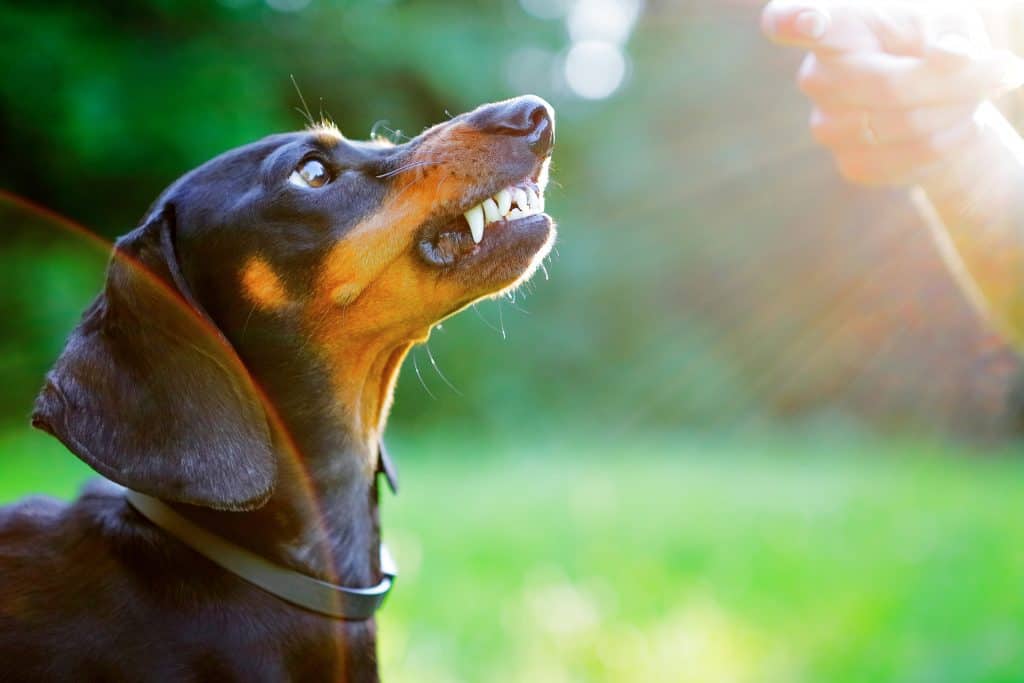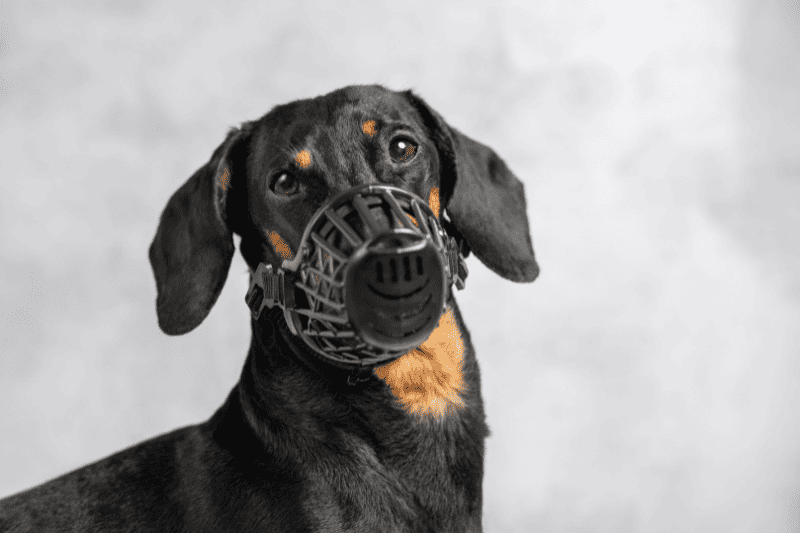
If you have been thinking about getting a dachshund or already own one, you may be curious if these furry friends are prone to biting and could pose any kind of danger. Despite their reputation as being loyal and affectionate companions, it is important to understand the nature of your dachshund’s temperament regarding its propensity for biting.
Do Dachshunds bite?
Dachshunds are usually pleasant and make excellent housemates, however, they can bite out of fear, anxiety, or aggression. Additionally, these dogs may chase smaller animals as well as display aggressive behavior towards strangers and unfamiliar pets.
However, like all dogs, Dachshunds have their unique personality traits, and some individuals may be more prone to biting than others.
Factors that may cause aggression
Dachshund aggression can be caused by a combination of factors, one being insufficient socialization. This can lead to dogs feeling scared and anxious. Other elements that may come into play are past negative encounters such as abuse or mistreatment, as these instances could also cause fear-based aggression.
Additionally, it is not uncommon for dachshunds to become aggressive with strangers if they feel their safety or that of their family is under threat, real or perceived.
Signs of aggression in dachshunds
It is important to recognize the signs of aggression in dachshunds to prevent any potential incidents. Some common signs of aggression in dachshunds include growling, snarling, baring their teeth, snapping, biting, and lunging.
It is also important to pay attention to your dachshund’s body language, as signs such as a stiff posture, raised hackles, and intense eye contact can indicate that your dachshund is feeling threatened or aggressive.
Understanding the factors that can cause aggression in Dachshunds and recognizing the signs of aggression are important steps in preventing potential biting incidents.

How hard can a dachshund bite?
Dachshunds are small dogs with big personalities, but how hard can they bite? In this section, we will explore the strength of a Dachshund’s bite and compare it to other breeds.
There is no exact data on the bite force of Dachshunds, but some experts estimate their bite force to be around 100 to 125 pounds per square inch (PSI), which is very close to the bite force of a human (120-160 psi). While this may not seem much compared to larger breeds like Rottweilers or Pit Bulls, it is important to remember that Dachshunds have long, sharp teeth that can easily penetrate the skin.
When compared to other dog breeds, Dachshunds do not have the strongest bite. For example, the average bite force of a Pit Bull is around 235 PSI, while that of a Rottweiler is around 328 PSI. However, it is important to note that any dog can cause serious injury if they bite.
Dachshunds have a unique jaw structure designed for digging and hunting small prey, such as rodents. Their long, narrow snouts and sharp teeth enable them to easily grab and hold onto their prey.
Reasons why Dachshunds may bite
Dachshunds are generally friendly and affectionate dogs; however, like any breed, they can bite in certain situations.
Some reasons why Dachshunds might bite include:
- Fear or anxiety: Dachshunds may feel threatened or scared in certain situations, and they may bite as a form of self-defense.
- Pain or discomfort: If a dachshund is experiencing pain or discomfort, it may lash out and bite as a way to communicate its distress.
- Territorial behavior: Dachshunds may be protective of their home and family, and they may bite to defend their territory.
- Lack of socialization: Dachshunds who have not been properly socialized may be fearful or aggressive towards strangers and other dogs.
Understanding Dachshund body language
One way to prevent potential biting incidents is to understand and recognize your Dachshund’s body language. Signs that your Dachshund may be feeling anxious or aggressive include:
- Growling or snarling
- Bared teeth
- Raised hackles (the fur along their back)
- Stiff body posture
- Avoiding eye contact
If you notice any of these signs, it is important to give your dachshund space and avoid any actions that may escalate the situation.
Related post: Are dachshunds aggressive?

How Can I Stop My Dachshund Biting?
Tips for preventing Dachshund biting
If your dachshund’s biting habits are worrisome, there are a few steps you can take to put a stop to them.
Some tips include:
- Start training early: As mentioned in the previous section, early training and socialization are key in preventing biting behavior; therefore, start training early.
- Avoid rough play: Rough play can trigger biting behavior in dachshunds, so it is important to establish boundaries and avoid any games that encourage nipping or biting.
- Be aware of triggers: pay attention to your dachshund’s body language and be aware of situations that may trigger biting behavior. Avoid or manage these situations as much as possible.
Positive reinforcement training methods
Positive reinforcement training methods are successful in curbing the biting behavior exhibited by Dachshunds. Rather than reprimanding the canine for unwanted actions, rewarding their good conduct with treats or words of admiration, this positive stimulation yields much better results!
Some examples of positive reinforcement training methods include:
- Clicker training: Clicker training is an effective way to instruct your dachshund with the help of a small clicking device. When it performs the desired behavior, you simply click and reward it with something like a treat. Simple yet highly efficient!
- Treat training: Treat training involves rewarding your dachshund with a treat for performing a desired behavior, such as sitting or staying.
- Praise and affection: Dachshunds respond well to praise and affection, so be sure to give plenty of verbal praise and cuddles when they exhibit good behaviors.
Seeking professional help if necessary
If your dachshund’s biting behavior is causing serious concerns, it may be necessary to seek professional help. A certified dog trainer or animal behaviorist can assess your dachshund’s behaviors and guide effective training techniques. In some cases, medications or other interventions may be necessary to address underlying anxiety or behavioral issues.
Related post: How do I stop my Dachshund from being aggressive?
Conclusion
In sum, Dachshunds can be wonderful companions if their biting tendencies are recognized and managed. It is essential to make sure they receive proper training and socialization so that they become well-mannered pets.
If ever in doubt about your pup’s behavior, seek the assistance of a professional trainer or behaviorist. At the end of it all, with appropriate understanding and care, you will have an enjoyable relationship with your four-legged friend!
We have discussed the potential reasons for aggression and biting in dachshunds, as well as ways to prevent and address the behavior. Positive reinforcement training methods can be highly effective in reducing biting incidents, and seeking professional help may be necessary for more severe cases.
It is also important to note that, despite their small size, dachshunds can still cause harm with their bite, so owners should always be vigilant and aware of their dog’s behavior. We hope this article has been informative and helpful in understanding the topic of dachshund biting.
Thanks for reading this article. We hope you find it useful. Have fun bonding with your furry pal, and remember, safety first!
Related post: Managing Dachshund Behavior Problems
Recent Posts
Calculate the perfect food portions for your dachshund with our specialized calculator. Get customized feeding recommendations based on size, age, and activity level to support your wiener dog's back...
Looking for the perfect gift for a proud dachshund mom? We’ve rounded up the cutest dachshund shirts that celebrate your love for wiener dogs in style. Whether you’re shopping for yourself or a...


